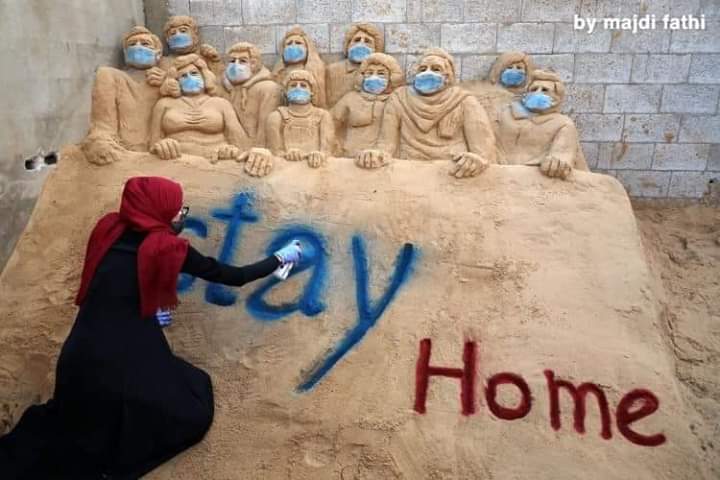
|
April 11, 2020 - No. 12
Matters of Concern as the COVID-19 Pandemic Unfolds • Pandemic Reveals the New Direction Canada Needs - Pauline Easton and K.C. Adams - • Trudeau Government's Use of Pandemic to Serve Private Interests - Louis Lang - • "The People" Are Not the Problem -- They Are the Solution - Steve Rutchinski - • The Government's Words and Its Deeds - T. Sullivan - • Immediately Reopen Canada's Border to Refugees! - Diane Johnston - • Pay
Increases That Make Fools of Us All Global Crisis in the Oil Sector • International
Virtual Meetings to Reduce
Oil Production Palestine • Crimes of Occupiers Intensify During Pandemic
• Update on Global Pandemic for Week Ending April 11
• Inter-Imperialist
and Inter-Cartel
Contention Matters of Concern as the COVID-19 Pandemic Unfolds Pandemic Reveals the New Direction Canada Needs |
|
Palestine
Crimes of Occupiers Intensify During Pandemic
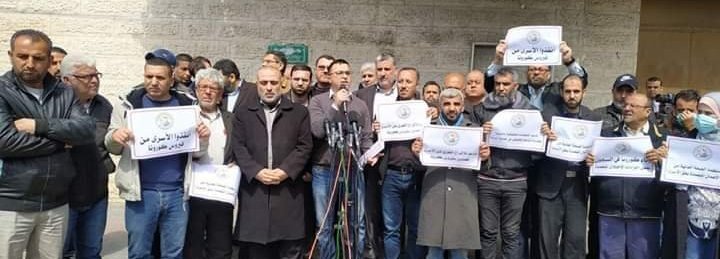
Protest on March 19, 2020, at the International
Committee of the Red
Cross offices in Gaza City demands protection for
Palestinian political
prisoners.
The global COVID-19 crisis is simultaneously bringing out the very best and the very worst of humanity. This is no more true than in Palestine, whose heroic people this year are marking 72 years of steadfast resistance to occupation, dispossession and lawlessness by the Israeli occupation. Whereas the global pandemic requires all of humanity to rise to the occasion, Zionist reactionaries are using the crisis as a means to further their genocide against the Palestinian people.
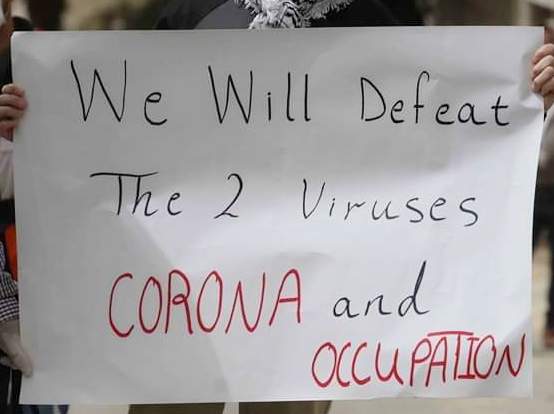 In an April 2
letter to the President of the UN Security
Council, Dr. Riyad Mansour,
Minister and Permanent Observer of the State of
Palestine to the United
Nations highlighted that crimes against the
Palestinian people continue
unabated during the pandemic.
In an April 2
letter to the President of the UN Security
Council, Dr. Riyad Mansour,
Minister and Permanent Observer of the State of
Palestine to the United
Nations highlighted that crimes against the
Palestinian people continue
unabated during the pandemic.
Mansour reports, "A state of emergency has been declared [in Palestine] and the country is in lockdown with a view to stemming the virus' spread, protect our population, and ensure their well-being. Despite limited resources and the hardships and restrictions already being borne under Israel's illegal occupation, our national institutions are exerting all possible efforts to respond to this health crisis and its immense humanitarian and socio-economic impact.
"Regrettably, however, in the West Bank, including East Jerusalem, Israel is exploiting the state of emergency and lockdown to accelerate its illegal settler-colonization plans, including through the continued demolition of Palestinian homes, destruction of crops, and forcible transfer of Palestinian families. At the same time, military raids in Palestinian areas have continued, as have Israeli settler attacks on Palestinian civilians, in numerous instances undermining efforts to combat the pandemic. [...] Israeli settlement construction and expansion and annexation threats have continued unabated."
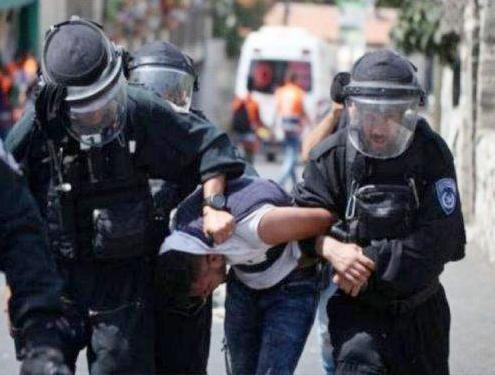
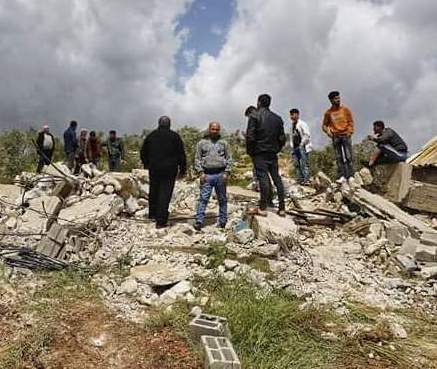
Israel continues violent detention of
Palestinian youth
(left); and destruction of Palestinian homes
(photo is from Rommana).
Other crimes by the Israeli occupiers have directly undermined Palestinian efforts to contain the virus. These include the destruction of a health clinic under construction, the detention of Palestinian workers disinfecting public facilities and, those involved in public education efforts, and assaulting Palestinians working in local emergency committees created to help detect coronavirus cases. Repeated acts of spitting by dozens of Israeli soldiers at Palestinians' cars, walls and doorsteps to intimidate residents amid the COVID-19 outbreak have also been reported.
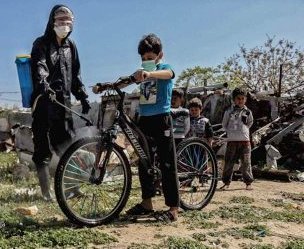
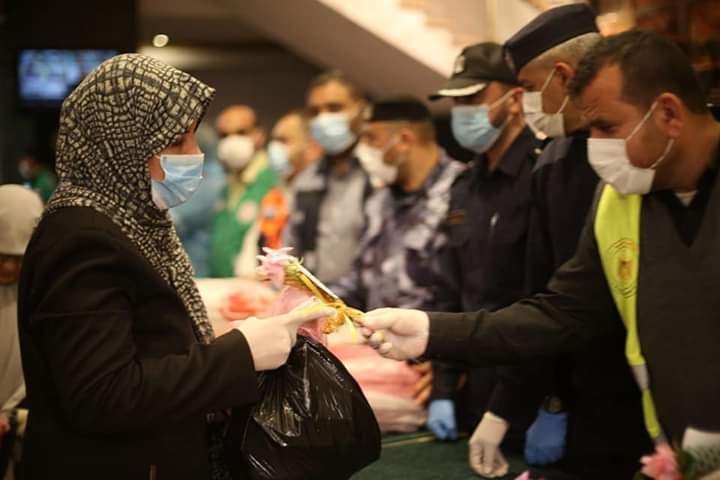
Palestinian workers disinfect for coronovirus
(left); COVID-19 testing
Centre in Gaza.
Concern over Israel's mass incarceration of Palestinians has been heightened during the pandemic. Mansour informs, "Israel is refusing to heed calls for the release of the more than 5,000 Palestinians, including 180 children and 43 women, that it currently holds captive in its prisons and detention centres, despite four Palestinian prisoners having been exposed to an Israeli employee at an interrogation centre who tested positive for COVID-19. [...] Israeli jails are overcrowded, lacking minimum health and safety standards, and poor conditions, including the requirement for prisoners to pay for their own medical treatment and blatant medical neglect, have led prisoners to launch several hunger strikes in recent years. Dozens of Palestinian prisoners also suffer from serious or chronic illnesses and are in need of urgent medical care. To make matters worse, Israel removed all doctors and nurses who were previously tending to Palestinian prisoners, leaving only one nurse per prison, yet a further shocking act of medical negligence.
|
|
"In this time of crisis, Palestinians also face another consequence of this decades-long occupation -- a dilapidated and depleted health care system that is marked by poor infrastructure and sanitation, a shortage of supplies and inadequate equipment. With just 1.23 beds per 1,000 people, 2,550 working doctors, less than 20 intensive care specialists and less than 120 ventilators in all public hospitals, the West Bank will face a public health disaster if the virus spreads further. And, while the health care situation there is bleak, in the Gaza Strip it is catastrophic.
"As noted by OCHA [the Office for the Coordination of Humanitarian Affairs] on March 26, 'although the current number of detected cases remains relatively low, the capacity of the Palestinian health system to cope with an expected increase in COVID-19 cases is severely impaired by longstanding challenges and critical shortages ... the situation is particularly severe in the Gaza Strip.' For a population of nearly 2 million, half of whom are children, Gaza has only 56 breathing ventilators for adults, some of which are in disrepair or already in use, 60 intensive care unit beds, and 700 units of personal protective equipment." News reports on April 8 indicate that Gaza has now run out of COVID-19 test kits.
The Gisha Legal Center for Freedom of Movement on April 1 issued a press release demanding Israel take immediate action to protect food security and prevent economic collapse in the Gaza Strip, including the removal of "ongoing restrictions imposed by Israel on the entry of so-called 'dual-use' equipment and materials for which there is an acute need in Gaza's farming and fishing sectors, and to allow the exit of Gaza-made food products for sale in the West Bank."
(Photos: Quds News, O. Daibes, M. Fathi)
For Your Information
Update on Global Pandemic for
Week Ending April 11
Dr. Tedros Adhanom Ghebreyesus, Director General of the World Health Organization (WHO) highlighted two notable dates in his regular briefings in the past week.
Speaking on April 9, Dr. Tedros noted that the WHO would on April 10 mark the 100th day since it was notified on January 1 of the first cases of "pneumonia with unknown cause" in China. He outlined the intensive course of action undertaken by the WHO since then, to establish the necessary organization and infrastructure to combat the outbreak and to sound the alarm to all countries. He highlighted the five key areas in which its efforts continue to be focused:
- supporting countries in building their capacity to prepare and respond;
- working with experts, partners in media, technology and other sectors, to provide training guidance and accurate information and to combat misinformation;
- supplying essential medical equipment for frontline health workers;
- training and mobilizing health workers; and
- accelerating research and development into diagnostics and therapy.
April 7 was World Health Day, marking the day that the WHO came into being in 1948. On that day, Dr. Tedros explained, that for the rest of 2020 the WHO will be marking the International Year of the Nurse and the Midwife. Dr. Tedros took this occasion to highlight in particular the outstanding role played by nurses during the pandemic. He pointed out that "80 per cent of the world's nurses work in countries making up just half of the world's population.
"Although the number of nurses globally increased by 4.7 million between 2013 and 2018, the world is facing a global shortfall of 5.9 million nurses, especially in Africa, South East Asia, the Eastern Mediterranean and some parts of Latin America.
"We're calling on countries with shortages of nurses to increase the number of nurses they graduate by an average of 8 per cent each year, and to implement measures to improve the employment and retention of nurses in the health system."[1]
Number of Cases Worldwide
As of April 11, the worldwide statistics for COVID-19 pandemic as reported by Worldometer were:
Total reported cases: 1,760,584 (April 4: 1,132,017)
- active cases: 1,257,555 (April 4: 835,784)
- closed cases: 509,797 (April 4: 296,233)
Deaths: 101,485 (April 4: 60,331)
Recovered: 395,404 (April 4: 235,902)
There were 94,625 new cases from April 9 to 10. This compares to the one-day increase in cases from April 3 to 4 of 84,821.
The disease was present in 210 countries and territories. Of these, 83 had less than 100 cases, as compared to April 4, when the disease was present in 205 countries and territories, with 85 of those having less than 100 cases.
The five countries with the highest number of cases on April 11 are noted below, accompanied by the number of cases and deaths per million population, which permit a more direct comparison between countries, as well as figures from the previous week on April 4:
USA: 521,714 (473,070 active; 28,580
recovered; 20,064 deaths)
- 1,519 cases per million population; 57 deaths
per million population
- April 4: 277,533 (257,847 active; 12,283
recovered; 7,403 deaths)
Spain: 158,273 (86,524 active;
55,668 recovered; 16,801 deaths)
- 3,385 cases per million; 344 deaths per million
- April 4: 124,736 (78,773 active; 34,219
recovered; 11,744 deaths)
Italy: 147,577 (98,273 active; 30,455
recovered; 18,849 deaths)
- 3,605 cases per million; 302 deaths per million
- April 4: 119,827 (85,388 active; 19,758
recovered; 14,681 deaths)
France: 124,869 (86,740 active;
24,932 recovered; 13,197 deaths)
- 1,913 cases per million; 202 deaths per million
- April 4: 82,165 (61,650 active; 14,008
recovered; 6,507 deaths)
Germany: 122,171 (65,522
active; 53,913 recovered; 2,736 deaths)
- 1,458 cases per million; 33 deaths per million
- April 4: 91,159 (65,309 active; 24,575
recovered; 1,275 deaths)
The U.S. remains the country with the highest number of cases for the third week in a row, while in the past week France surpassed Germany for the fourth highest number of cases. Despite the U.S. situation, Europe remains the hardest hit region, with 820,109 cases (553,264 active; 196,782 recovered; 70,063 deaths).
Cases in Top Five Countries by Region
In Europe on April 11, the five countries with the highest number of reported cases were:
Spain: 158,273 (86,524 active;
55,668 recovered; 16,801 deaths)
- 3,385 cases per million; 344 deaths per million
- April 4: 124,736 (78,773 active; 34,219
recovered; 11,744 deaths)
Italy: 147,577 (98,273 active; 30,455
recovered; 18,849 deaths)
- 3,605 cases per million; 302 deaths per million
- April 4: 119,827 (85,388 active; 19,758
recovered; 14,681 deaths)
France: 124,869 (86,740 active;
24,932 recovered; 13,197 deaths)
- 1,913 cases per million; 202 deaths per million
- April 4: 82,165 (61,650 active; 14,008
recovered; 6,507 deaths)
Germany: 122,171 (65,522
active; 53,913 recovered; 2,736 deaths)
- 1,458 cases per million; 33 deaths per million
- April 4: 91,159 (65,309 active; 24,575
recovered; 1,275 deaths)
UK: 73,758 (64,465 active; 344
recovered; 8,958 deaths)
- 1,086 cases per million; 132 deaths per million
- April 4: 38,168 (34,428 active; 135 recovered;
3,605 deaths)
The rate of new cases in Spain has started to slow. Health Minister Salvador Illa explained on April 8 that the rate of new cases two weeks prior was 15 per cent per day, but had slowed to 7 per cent in the following week.[2] He attributed an increase in the rate this past week to a backlog in regional data that had now been processed, and stated that Spain had now passed through the peak of the curve.
"The data confirmed the stabilization of the curve, it's flattening out. We have reached the peak and we are in a phase of slowing down," said Illa, adding that authorities would roll out a mass testing plan to examine the level of immunity to COVID-19 in the population, starting with 62,000 tests.
Fernando Simón, head of Spain's public health emergency department, said that as the country approaches the end of the first phase of the lockdown, the gradual lifting of restrictions -- forecast to start on April 26 -- would present another set of challenges. Although some liberties will be restored, the public will have to remain vigilant and continue to adhere to strict social distancing rules to avoid a resurgence of the virus, he said.
Bruce Aylward, the head of the WHO mission to Spain, told a Geneva video press conference that the country's decision to fully confine its roughly 47 million people as a response to the pandemic had been inspirational, Eurativ news agency reported on April 8. "What I saw in Spain was truly heroic," he said, adding that it was "an extraordinary and innovative response."
Aylward emphasized the "striking speed" of the outbreak in the country -- in the early days of the pandemic in late February, Spain was registering just two or three cases per day, mostly tourists vacationing in the country's islands. Less than two weeks later, all 17 of Spain's autonomous regions had registered cases and the number of infections was doubling every day, he said. Between March 7 to 14, cases increased 20-fold. However, following Prime Minister Pedro Sánchez's decision to place the country on lockdown, those figures went from doubling every five days to doubling every eight, said Aylward, adding there was "hope and evidence that this outbreak is definitely slowing down."
In Italy, which shut down much of its businesses on March 12, Euractiv reports, "The closures and accompanying containment measures have helped stem the spread of a disease that has officially claimed 17,669 lives across the country since February, the world's highest toll.
"The Italian government is now weighing how and when to ease social distancing measures that have so far been extended until April 13."[3]
Italian Prime Minister Giuseppe Conte said on April 9 that the government will consult with its scientists regarding which businesses and factories should be first to reopen. "If scientists confirm it, we might begin to relax some measures already by the end of this month," he stated.
The pandemic has brought out divisions between the hardest hit countries -- such as Italy and Spain in southern Europe -- and other members on the question of financial aid for businesses and workers affected by the pandemic. It is reported that a fractious Eurogroup video conference took place on April 8, with the Netherlands demanding that nations meet tough economic conditions to qualify for aid. Prime Minister Conte gave the view that, "If we do not seize the opportunity to put new life into the European project, the risk of failure is real."
Another notable feature of these statistics is that the UK, while having a lower absolute number of cases per million population, has a relatively high absolute number of deaths and number of deaths per million.
In Eurasia on April 10:
Turkey: 42,282 (39,232 active;
2,142 recovered; 908 deaths)
- 501 cases per million; 11 deaths per million
- April 4: 20,921 (20,012 active; 484 recovered;
425 deaths)
Russia: 11,917 (11,028 active;
795 recovered; 94 deaths)
- 82 cases per million; 0.6 deaths per million
- April 4: 4,731 (4,355 active; 333 recovered; 43
deaths)
Azerbajian: 991 (822 active;
159 recovered; 10 deaths)
- 98 cases per million; 1 death per million
- April 4: 521 (484 active; 32 recovered; 5
deaths)
Armenia: 937 (776 active; 149
recovered; 12 deaths)
- 316 cases per million; 4 deaths per million
- April 4: 770 (720 active; 43 recovered; 7
deaths)
Kazakhstan: 764 (697 active; 60
recovered; 7 deaths)
- 43 cases per million; 0.5 deaths per million
- April 4: 525 (484 active; 36 recovered; 5
deaths)
This week's figures show that the number of cases roughly doubled in Turkey, Russia and Azerbajian since April 4. Despite Turkey's situation, it is providing aid to several other countries, including Lebanon, Tunisia, the UK, Macedonia, Serbia, Bosnia and Herzegovina, Montenegro, North Macedonia, and Kosovo, Anadolu Agency reported.
In West Asia on April 10:
Iran: 68,192 (28,495 active;
35,465 recovered; 4,232 deaths)
- 812 cases per million; 50 deaths per million
- April 4: 55,743 (32,555 active; 19,736
recovered; 3,452 deaths)
Israel: 9,968 (8,871 active;
1,011 recovered; 86 deaths)
- 1,166 cases per million; 11 deaths per million
- April 4: 7,589 (7,119 active; 427 recovered; 43
deaths)
Saudi Arabia: 3,287 (1,663
active; 351 recovered; 25 deaths)
- 105 cases per million; 1 death per million
- April 4: 2,039 (1,663 active; 351 recovered; 25
deaths)
UAE: 2,659 (2,408 active; 239
recovered; 12 deaths)
- 302 cases per million; 1 death per million
- April 4: 1,264 (1,147, 62 recovered; 9 deaths)
Qatar: 2,376 (2,164 active; 206
recovered; 6 deaths)
- 872 cases per million; 2 deaths per million
- April 4: 1,075 (979 active; 93 recovered; 3
deaths)
On March 23, UN Secretary-General Antonio Guterres called for a ceasefire in all global conflicts to stem the pandemic. This was followed two days later by a call for a cessation of hostilities in the war in Yemen.
Saudi Arabia, the aggressor in this war, on April 8, announced via a statement carried by Saudi Arabia's official state news agency, that it was declaring a unilateral ceasefire to go into effect on April 9. Saudi military spokesman, Col. Turki al-Malki stated that the ceasefire is to last two weeks and could be extended to pave the way for all the parties "to discuss proposals, steps, and mechanisms for sustainable ceasefire in Yemen [...] for a comprehensive political solution in Yemen."[4]
Yemen reported its first case of coronavirus on April 10.
In South Asia on April 10:
India: 6,725 (5,879 active; 620
recovered; 226 deaths)
- 5 cases per million; 0.2 cases per million
- April 4: 3,082 (2,767 active; 229 recovered; 86
deaths)
Pakistan: 6,495 (5,702 active;
727 recovered; 66 deaths)
- 29 cases per million; 0.3 deaths per million
- April 4: 2,708 (2,537 active; 130 recovered; 41
deaths)
Afghanistan: 521 (474 active;
32 recovered; 15 deaths)
- 13 cases per million; 0.4 deaths per million
- April 4: 299 (282 active; 10 recovered; 7
deaths)
Bangladesh: 424 (364 active; 33
recovered; 27 deaths)
- 3 cases per million; 0.2 deaths per million
- April 4: 70 (32 active; 30 recovered; 8 deaths)
Sri Lanka: 190 (129 active;
54 recovered; 7 deaths)
- 9 cases per million; 01. deaths per million
- 159 (129 active; 25 recovered; 5 deaths)
The figures coming out of India continue to beggar belief, given that it is the second most populous country in the world with 1.3 billion people. The impoverishment, crowded living conditions and lack of health care for the vast majority of people, amidst the anti-social offensive of the Modi government mean that conditions are ripe for a terrible outbreak. An April 6 report from Reuters indicates that testing levels remain extremely low: "Officials hope to be testing 20,000 people daily by the end of the week, twice the current rate. Since India's first case was confirmed on Jan. 30, India has conducted only a little over 96,000 tests, having focused efforts on identifying those who had come in contact with people who have tested positive." In comparison, south Korea, which has used widespread testing to combat the pandemic and bring it under control, by mid-March, had tested 270,000 in two months.
India has been under lockdown since March 24.
Originally due to be lifted on April 14, the Modi
government announced April 11 that the lockdown
has been extended indefinitely. However, it has
yet to announce what measures will be provided to
ease the hardship of the millions of impoverished
workers across the country already, whose dire
situation is sure to worsen if proper measures are
not taken.
In Kashmir, which was has been under security lockdown by the Indian government since August 2019, conditions have worsened during the pandemic, with medical staff and students complaining about limited internet connectivity. Internet access was restored in March, but high-speed access is still banned.
"We need uninterrupted internet to fight COVID-19. We are required to stay in touch with the WHO, CDC [Centers for Disease Control and Prevention] and ICMR [Indian Council of Medical Research] and download their guidelines. We are missing out on a lot of information," Dr. Suhail Naik, president of Doctor's Association Kashmir, told Deutsche Welle.[5]
Students in Kashmir report facing long download times for their lessons and being denied the opportunity to take part in learning via interactive activities online, unlike other students in India.
In Bangladesh, workers have been hard hit by the pandemic. The closure of clothing retailers in Asia, Europe and North America has had a serious impact on garment workers in countries like Bangladesh. On March 19, Reuters reported that "global fashion brands have canceled or delayed orders worth $138 million due to coronavirus." The report added that "More than 100 Bangladeshi factories have already lost orders."[6]
Reuters points out that Bangladesh is "the world's second largest garment supplier after China [and] is heavily-reliant on top fashion brands. The industry employs more than 4 million people, mostly women, and accounts for more than 80 per cent of its exports."
A March 27 report from the PennState Center for Global Workers' Rights stated that some one million of these workers have now been laid off.[7]
The latest reports from Bangladesh indicate that a small number of factories are now making personal protective equipment that is in short supply worldwide. However, the factory workers themselves have had to stage walkouts because of insufficient measures taken by employers to stop the spread of the coronavirus.
In Southeast Asia on April 10:
Malaysia: 4,346 (2,446 active;
1,830 recovered; 70 deaths)
- 134 cases per million; 2 deaths per million
- April 4: 3,483 (2,511 active; 915 recovered; 57
deaths)
Philippines: 4,076 (3,749
active; 124 recovered; 203 deaths)
- 38 cases per million; 2 deaths per million
- April 4: 3,094 (2,893 active; 57 recovered; 144
deaths)
Indonesia: 3,293 (2,761 active;
252 recovered; 280 deaths)
- 13 cases per million; 1 death per million
- April 4: 2,092 (1,751 active; 150 recovered; 191
deaths)
Thailand: 2,473 (1,427 active;
1,013 recovered; 33 deaths)
- 35 cases per million; 0.5 deaths per million
- April 4: 2,067 (1,435 active; 612 recovered; 20
deaths)
Singapore: 2,108 (1,444 active;
492 recovered; 7 deaths)
- 360 cases per million; 1 death per million
- April 4: 1,114 (826 active; 282 recovered; 6
deaths)
Indonesia, the world's fourth most populous country (after China, the U.S. and India) has a very low number of reported cases thus far, although cases have been reported in all provinces. While everyone has been encouraged by the Health Ministry to stay home, only the worst hit province of Jakarta has implemented social-distancing measures.
In the Philippines, President Rodrigo Duterte said on April 1 that he was authorizing the police and military to use deadly force against anyone violating pandemic measures. "Without these restrictions, this will not end," he said. "So if you don't want to follow, then I will finish you to protect the lives of the innocent who don't want to die." The island of Luzon in the north has been under lockdown since March 16, with local lockdowns in place across the country. An additional measure taken by the government on April 10 was to ban medical professionals from going overseas. The order, issued by the Philippines Overseas Employment Administration, stated in part that "The ban aims to prioritize human resource allocation for the national health care system at the time of the national state of emergency." In 2018, remittances from overseas Filipinos, estimated at 11 million, made up 11 per cent of the country's GDP.
Another notable development in this region was an
unexpected spike of 142 new cases in Singapore on
April 8, after its
lockdowns had appeared to stop the spread of the
disease. This has
raised concerns of longer term measures required
to prevent the
outbreaks from reoccuring. The latest cases appear
to have arisen due to substandard living
conditions for migrant workers, agencies report,
which the government says it will address.
In East Asia on April 10:
China: 81,907 (1,160 active;
77,370 recovered; 3,335 deaths)
- 57 cases per million; 2 deaths per million
- April 4: 81,639 (1,558 active; 76,755 recovered;
3,326 deaths)
South Korea: 10,450 (3,125
active; 7,117 recovered; 208 deaths)
- 204 cases per million; 4 deaths per million
- 10,156 (3,654 active; 6,325 recovered; 177
deaths)
Japan: 5,530 (4,746 active; 685
recovered; 99 deaths)
- 44 cases per million; 0.8 deaths per million
- April 4: 2,935 (2,352 active; 514 recovered; 69
deaths)
Taiwan: 382 (285 active; 91
recovered; 6 deaths)
- 16 cases per million; 0.3 deaths per million
- April 4: 355 (300 active; 50 recovered; 5
deaths)
Japan saw an increase of nearly 2,000 cases between April 4 to 10, while other countries in the region saw increases of about 30 to 300 in that period. On April 8, Japanese Prime Minister Shinzo Abe declared a state of emergency in Tokyo and six other Japanese prefectures with high numbers of cases, out of a total of 47 prefectures. The Associated Press reported that "Abe was facing heavy pressure to declare a state of emergency after the number of new cases in Tokyo began doubling every several days in late March. The city of 14 million had 1,339 cases as of Wednesday [April 8], up from about 600 a week earlier. Japan focused on dealing with clusters of infections and selective testing for the virus, a strategy that has failed to curb its spread. Experts found that one-third of Tokyo's recent cases were linked to hostess clubs and other night entertainment districts where cluster tracing is difficult. Meanwhile, compliance with calls for working remotely and other social distancing has been weak."[8]
In North America on April 11:
USA: 521,714 (473,070 active; 28,580
recovered; 20,064 deaths)
- 1,519 cases per million population; 57 deaths
per million population
- April 4: 277,533 (257,847 active; 12,283
recovered; 7,403 deaths)
Canada: 22,148 (15,566 active; 6,013
recovered; 569 deaths)
- 587 cases per million; 15 deaths per million
- April 4: 12,549 (10,019 active; 2,322 recovered;
208 deaths)
Mexico: 3,441 (2,614 active;
633 recovered; 194 deaths)
- 27 cases per million; 2 deaths per million
- April 4: 1,688 (995 active; 633 recovered; 60
deaths)
Within the U.S., the state of New York and New
York City especially are the hardest hit by the
pandemic. As of April 11, New York State alone had
logged 180,458 cases, of which 155,314 are
active, and 8,627 deaths. New York City Mayor Bill
de Blasio on April 8
stated that it is likely that the city's death
toll is actually much
higher as many people are dying at home, rather
than in hospital, and
that increased death rates during the pandemic on
the order of 100 to
200 people per day are likely due to the
coronavirus.
In the Detroit metropolitan area which has been
identified as a major "hotspot" in the pandemic,
more than
2,000 people working in the healthcare industry
have been reported as
testing positive or showing symptoms consistent
with COVID-19. The
situation has created a great deal of anxiety as
well as anger.
Henry Ford Hospital announced on April 8 that over
700 of its 31,000
employees had tested positive for COVID-19 at its
five campuses across
Detroit and its suburbs. A spokesperson for the
Beaumont Hospital
system's eight sites said on April 6 that 1,500 of
their
employees, including 500 nurses, have symptoms
consistent with
COVID-19. Nurses working at Beaumont issued a
statement of their own
during the week of April 6 demanding additional
personal protective
equipment, additional pay, free and regular
testing and screening,
housing allowances and the hiring of additional
staff.[9]
Incoherence, inconsistency and self-serving partisanship continues to be a factor in undermining measures to contain the outbreak. For example, on April 7, in the midst of a state-wide stay-at-home-order, Wisconsin held its primary vote, using in-person voting. The stay-at-home order was issued by Democratic Governor Tony Evers. However, the state legislature, dominated by Republicans, went ahead and approved in-person voting. Consequently, some 7,000 poll workers refused to staff voting precincts due to concerns about their health and safety, and many polls were forced to close. Time Magazine reported that in the week before the election, "there were, at least, 1,119,439 requests for absentee ballots -- five to 10 times more than the state has ever had to process. And only days before the primary, tens of thousands of residents had not received their requested absentee ballots.
"Initially, a district court granted a six-day extension on when the ballots could be received by state election officials. But on the evening of April 6, the Wisconsin Republicans sought to overturn that decision, essentially double-daring voters to play a game of chicken at the voting booth with the deadly coronavirus. In a 4-2 decision, the Wisconsin Supreme Court ruled that Evers did not have the authority to move the day of the election. Then the five conservative justices on the U.S. Supreme Court ruled that the absentee ballots, despite the fact that thousands had not yet been received by voters, still had to be postmarked by the day of the primary, April 7."[10]
The Milwaukee Journal Sentinel reported that on April 6, "Wisconsin Department of Health Services Secretary Andrea Palm said in-person voting would 'without question' increase case totals, 'and an increase in the number of cases in Wisconsin would result in more deaths.'
"In many suburban and rural areas, lines were not too long. But in Milwaukee, Waukesha and Dane counties, lines stretched out onto sidewalks and around blocks, ending any chance of social distancing. In the city of Milwaukee, voters stood in line for hours at one of five consolidated 'voting centres' instead of the 180 smaller neighbourhood sites that voters normally use."[11]
Molly McGrath, a voting rights campaign strategist with the American Civil Liberties Union, described this as the decision to permit "voter suppression on steroids," adding, "The bottom line is no one should have to choose between protecting their health and protecting their right to vote."[12]
In Central America and the Caribbean: on April 10
Panama: 2,752 (2,670 active; 16
recovered; 66 deaths)
- 638 cases per million; 15 deaths per million
- April 4: 1,673 (1,622 active; 10 recovered; 41
deaths)
Dominican Republic: 2,620
(2,396 active; 98 recovered; 126 deaths)
- 242 cases per million; 12 deaths per million
- April 4: 1,488 (1,404 active; 16 recovered; 68
deaths)
Costa Rica: 539 (506 active; 30
recovered; 3 deaths)
- 106 cases per million; 0.6 deaths per million
- April 4: 416 (403 active; 11 recovered; 2
deaths)
Cuba: 565 (498 active; 51
recovered; 15 deaths)
- 50 cases per million; 1 death per million
- April 4: 269 (248 active; 15 recovered; 6
deaths)
Honduras: 382 (352 active; 7
recovered; 23 deaths)
- 39 cases per million; 2 deaths per million
- April 4: (264; 3 recovered; 15 dead)
In South America on April 10:
Brazil: 18,397 (17,250 active;
173 recovered; 974 deaths)
- 87 cases per million; 5 deaths per million
- April 4: 9,216 (8,724 active; 127 recovered; 365
deaths)
Ecuador: 7,161 (4,354 active;
339 recovered; 272 deaths)
- 406 cases per million; 17 deaths per million
- April 4: 3,368 (3,158 active; 65 recovered; 145
deaths)
Chile: 6,501 (4,865 active;
1,571 recovered; 65 deaths)
- 340 cases per million; 3 deaths per million
- April 4: 3,737 (3,288 active; 427 recovered; 22
deaths)
Peru: 5,897 (4,159 active;
1,569 recovered; 169 deaths)
- 179 cases per million; 5 deaths per million
- April 4: 1,595 (997 active; 537 recovered; 61
deaths)
Colombia: 2,223 (1,980 active;
174 recovered; 69 deaths)
- 44 cases per million; 1 death per million
- April 4: 1,409 (1,289 active; 88 recovered; 32
deaths)
In this region in the past week, the countries listed above roughly doubled the number of cases since April 4, while in Peru the cases increased by more than four times. Ecuador saw a large one day spike of 2,196 new cases from April 9 to 10.
Meanwhile, Venezuela, despite the U.S. sanctions, continues its remarkable job of protecting its people against the pandemic. There are only 171 total cases logged in the country, of which 78 are active, with 84 recoveries and 9 deaths. From April 6 to 7, only one new case was logged. Following this result, President Nicolás Maduro ordered the hospitalization of all people confirmed to be infected who were in isolation at home, as a further measure to stop community spread.
"We have managed to contain the pandemic. In the situation we are in, we can hospitalize all cases and isolate them in hospital. It is not the same to be at home with the possibility of infecting a husband, wife, brother, sister or a child, rather than being in a hospital or a clinic under isolation with 24-hour medical attention," he said. He added that Venezuela has 23,500 hospital beds.[13]
At this point, the curve of the outbreak is flattening in Venezuela, with the peak number of 100 active cases reached on April 5.
In Africa on April 10:
South Africa: 2,003 (1,569
active; 410 recovered; 24 deaths)
- 34 cases per million; 0.4 deaths per million
- April 4: 1,505 (1,401 active; 95 recovered; 9
deaths)
Algeria: 1,761 (1,100 active; 405
recovered; 256 deaths)
- 40 cases per million; 6 deaths per million
- April 4: 1,171 (1,004 active; 62 recovered; 105
deaths)
Egypt: 1,699 (1,233 active; 348
recovered; 118 deaths)
- 17 cases per million; 1 death per million
- April 4: 985 (979 active; 216 recovered; 66
deaths)
Morocco: 1,448 (1,168 active; 109
recovered; 97 deaths)
- 39 cases per million; 3 deaths per million
- April 4: 844 (735 active; 59 recovered; 50
deaths)
Cameroon: 820 (710 active; 54 recovered;
12 deaths)
- 31 cases per million; 2 deaths per million
- April 4: 509 (484 active; 17 recovered; 8
deaths)
In Oceania on April 10:
Australia: 6,328 (3,043 active;
3,141 recovered; 54 deaths)
- 245 cases per million; 2 deaths per million
- April 4: 5,550 (4,935 active; 585 recovered; 30
deaths)
New Zealand: 1,239 (921 active; 317
recovered; 1 death)
- 266 cases per million; 0.4 deaths per million
- April 4: 950 (822 active; 127 recovered; 1
death)
Guam: 128 (4 deaths)
- April 4: 112 (4 deaths)
French Polynesia: 51
- 182 per million
- April 4: 51
New Caledonia: 18 (17 active; 1
recovered)
Notes
1. "WHO Director-General's opening remarks at the media briefing on COVID-19," who.int, April 7, 2020.
2. "Spain sees uptick in daily COVID-19 cases, deaths and recoveries," euroefe.es, April 9, 2020.
3. "Italy PM warns virus puts EU project at stake," Euractiv, April 9, 2020.
4. "Saudi Arabia announces ceasefire in Yemen amid COVID-19 pandemic," Maggie Michael and Ahmed Al-Haj, Associated Press, April 8, 2020.
5. "COVID-19 crisis prolongs Kashmir lockdown," Dharvi Vaid, Deutsche Welle, April 10, 2020.
6. "Job cut fears as fashion brands slash orders in Bangladesh with coronavirus," Naimul Karim, Reuters, March 19, 2020.
7. Abandoned? The Impact of Covid-19 on Workers and Businesses at the Bottom of Global Garment Supply Chains, PennState Center for Global Workers' Rights, March 27, 2020.
8. "Japan declared a state of emergency, but it's no lockdown. So what is it?" Mari Yamaguchi, Associated Press, April 8, 2020.
9. “Detroit on the Frontline in Battle to End COVID-19 Panademic,” Abayomi Azikiwe, Global Research, April 9, 2020
10. "Republicans Could Use the Coronavirus to Suppress Votes Across the Country. This Week We Got a Preview," Carol Anderson, Time, April 8, 2020.
11. "In-person voting was likely a 'disaster' for Wisconsin's efforts to flatten coronavirus curve, national experts say," Devi Shastri, Milwaukee Journal Sentinel, April 8, 2020.
12. "'Voter suppression on steroids:' Wisconsin's decision to hold the state's in-person primary amid the COVID-19 pandemic will suppress voters, advocates warn," Connor Perrett, Business Insider, April 7, 2020.
13. "Venezuela Registers a Single New Case for COVID-19 in 24 Hours," teleSUR, April 7, 2020.
(To access articles individually click on the black headline.)
Website: www.cpcml.ca Email: editor@cpcml.ca
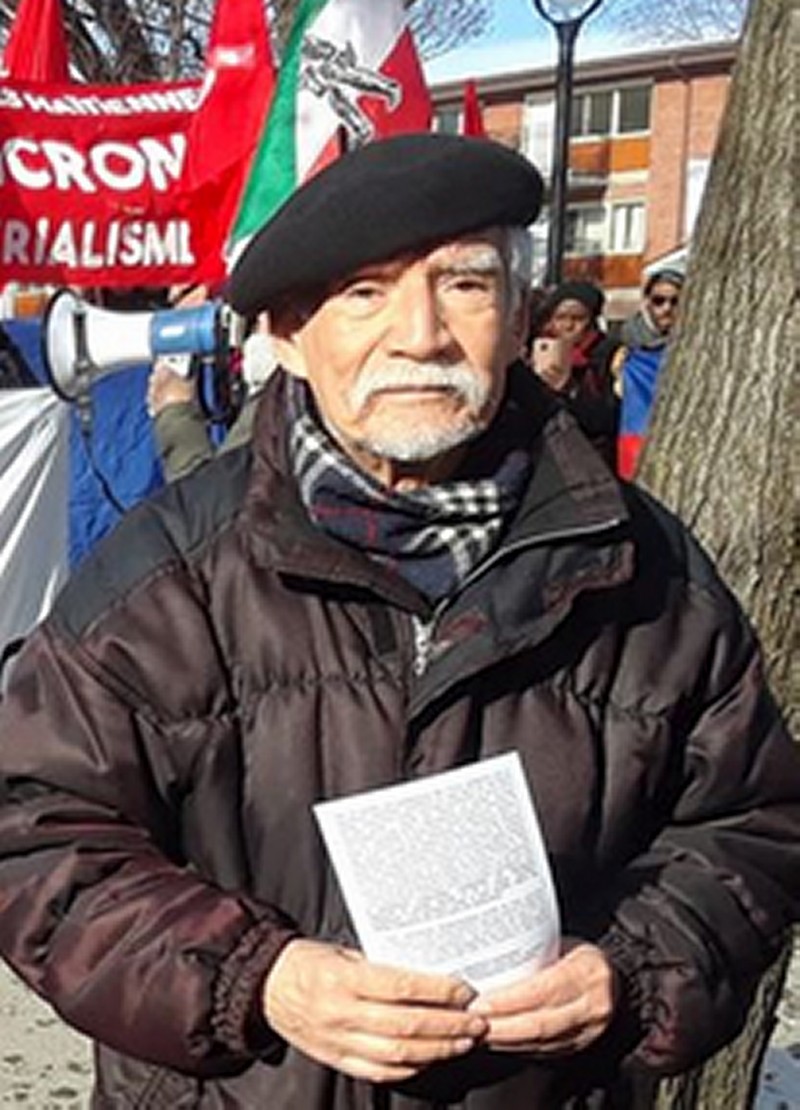

 U.S. President
Donald Trump announced in a White House press
briefing on April 3 that
he would use the Defense Production Act to
prevent
U.S. companies from selling N95 respirators,
surgical masks, gloves and
other personal protective equipment to other
countries, including
Canada and Mexico. He issued an executive order
giving the Federal
Emergency Management Agency (FEMA) the power to
"allocate to domestic
use" several types of medical personal protective
equipment that would
otherwise be exported.
U.S. President
Donald Trump announced in a White House press
briefing on April 3 that
he would use the Defense Production Act to
prevent
U.S. companies from selling N95 respirators,
surgical masks, gloves and
other personal protective equipment to other
countries, including
Canada and Mexico. He issued an executive order
giving the Federal
Emergency Management Agency (FEMA) the power to
"allocate to domestic
use" several types of medical personal protective
equipment that would
otherwise be exported.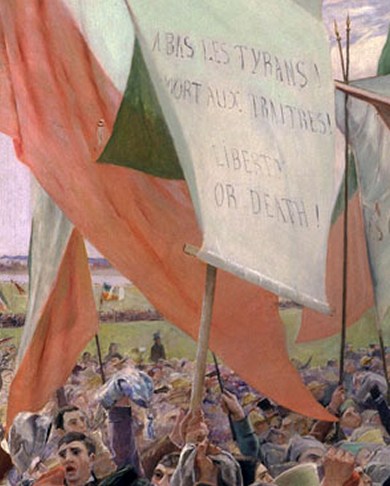 To characterize
Canada as a colony proper, a country occupied by a
European colonizing
population means that the state is oppressed. In
this regard, CPC(M-L)
pointed out the facts of the matter. Canada was
established as a colony
in the 1790s in the style of colonies established
with oppressor
states. To say that Canada was a colony proper and
that the Canadian
state was an oppressor state is not contradictory.
A state can be a
dependant state like Canada's, while at the same
time being an
oppressor state. There is no contradiction there
either.
To characterize
Canada as a colony proper, a country occupied by a
European colonizing
population means that the state is oppressed. In
this regard, CPC(M-L)
pointed out the facts of the matter. Canada was
established as a colony
in the 1790s in the style of colonies established
with oppressor
states. To say that Canada was a colony proper and
that the Canadian
state was an oppressor state is not contradictory.
A state can be a
dependant state like Canada's, while at the same
time being an
oppressor state. There is no contradiction there
either.
 This decision is
of great concern at this time as it puts the means
to meet the needs of
Canadians into the hands of a foreign corporation.
Premiers and
government officials across the country have
repeated in recent daily
briefings that one of the greatest lessons we have
learned so far is to
rely on our own resources to produce and deliver
the equipment that we
need to enable the front line workers to perform
their tasks as safely
as possible.
This decision is
of great concern at this time as it puts the means
to meet the needs of
Canadians into the hands of a foreign corporation.
Premiers and
government officials across the country have
repeated in recent daily
briefings that one of the greatest lessons we have
learned so far is to
rely on our own resources to produce and deliver
the equipment that we
need to enable the front line workers to perform
their tasks as safely
as possible.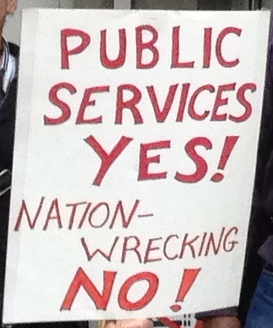 Canada Post has
the largest distribution network in Canada with
delivery capabilities
in every city, large and small. Postal workers
have all the experience
and know-how to carry out this task, quickly and
efficiently.
Canada Post has
the largest distribution network in Canada with
delivery capabilities
in every city, large and small. Postal workers
have all the experience
and know-how to carry out this task, quickly and
efficiently. The projections
are staggering indeed, however speculating on the
potential death toll,
applauding the government's own actions to date
and setting the stage
to blame the scope of whatever unfolds on
"everyone but essential
workers" who "fail to stay home and practice
physical distancing" is
far from being transparent!
The projections
are staggering indeed, however speculating on the
potential death toll,
applauding the government's own actions to date
and setting the stage
to blame the scope of whatever unfolds on
"everyone but essential
workers" who "fail to stay home and practice
physical distancing" is
far from being transparent! Who, however, is
to be held responsible for the restrictions placed
on testing for
COVID-19 infection or for the unacceptable delays
in processing
results? Why are there not enough labs, or
personal protective
equipment (PPE) for health care providers, or
ventilation equipment?
Who is responsible for the fact that even before
the pandemic hit more
than 1,000 people a night were receiving hallway
medicine because
hospitals were already filled to capacity?
Who, however, is
to be held responsible for the restrictions placed
on testing for
COVID-19 infection or for the unacceptable delays
in processing
results? Why are there not enough labs, or
personal protective
equipment (PPE) for health care providers, or
ventilation equipment?
Who is responsible for the fact that even before
the pandemic hit more
than 1,000 people a night were receiving hallway
medicine because
hospitals were already filled to capacity?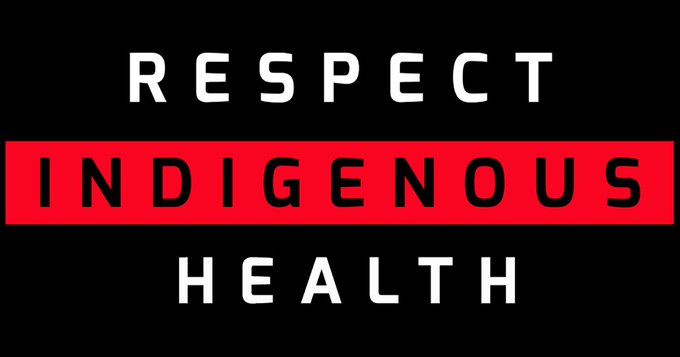 No matter which way
one turns,
the spotlight of the COVID-19 pandemic reveals
that this society, which
is geared to pay the rich, fails to meet the human
needs of a modern
society. The federal government, for example,
shamelessly pledges to
send bottled water to Indigenous communities to
promote hand hygiene,
and to provide tents so people living in
overcrowded decrepit housing
can "self-isolate." Health resources? No! Send in
the military to build
temporary field hospitals and declare a state of
emergency in isolated
Indigenous communities while the underlying social
conditions are not
addressed!
No matter which way
one turns,
the spotlight of the COVID-19 pandemic reveals
that this society, which
is geared to pay the rich, fails to meet the human
needs of a modern
society. The federal government, for example,
shamelessly pledges to
send bottled water to Indigenous communities to
promote hand hygiene,
and to provide tents so people living in
overcrowded decrepit housing
can "self-isolate." Health resources? No! Send in
the military to build
temporary field hospitals and declare a state of
emergency in isolated
Indigenous communities while the underlying social
conditions are not
addressed!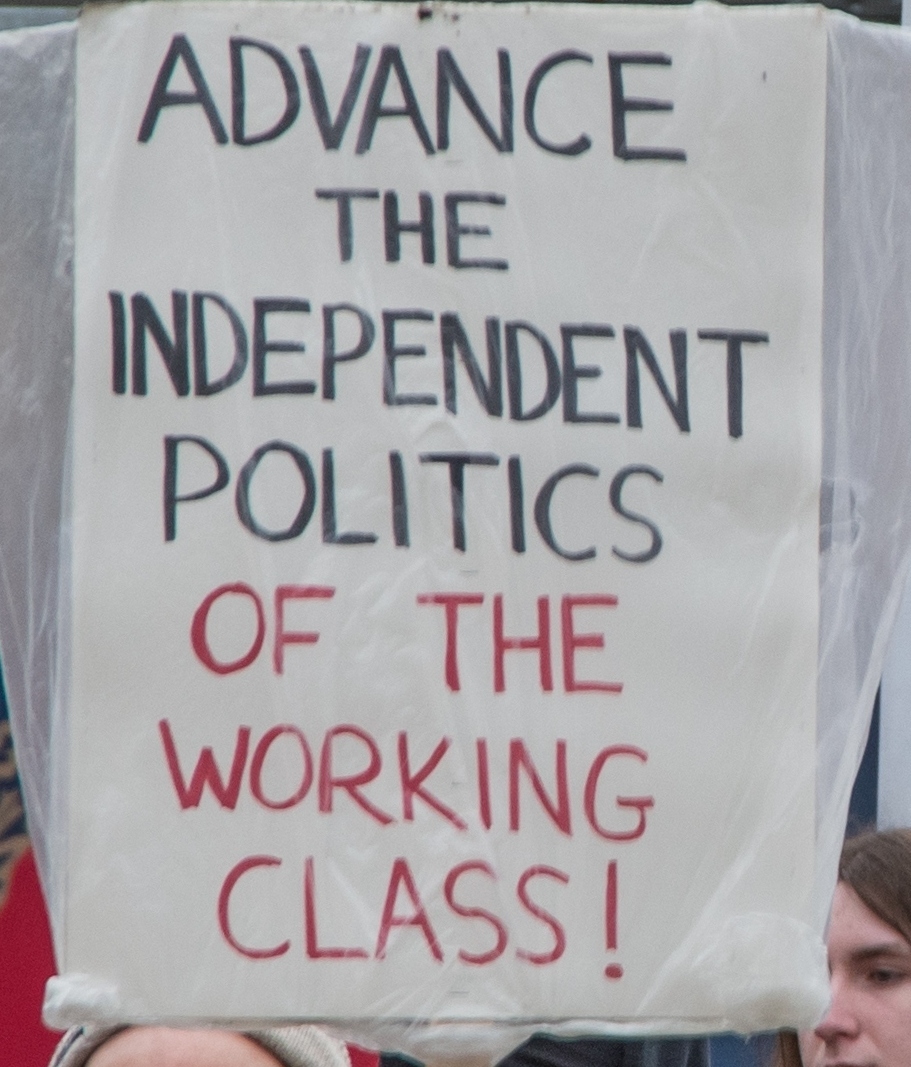 Meanwhile workers
all across the country are contending with the
consequences of decades
of cuts, closures and privatization that have
stripped away the ability
of the health care system to adequately meet the
needs of the people.
Both those who are working to bring an end to the
crisis and those who
have become its victims, are raising their
demands, speaking in their
own name and demanding that their needs be met so
they can save the
situation and turn things around.
Meanwhile workers
all across the country are contending with the
consequences of decades
of cuts, closures and privatization that have
stripped away the ability
of the health care system to adequately meet the
needs of the people.
Both those who are working to bring an end to the
crisis and those who
have become its victims, are raising their
demands, speaking in their
own name and demanding that their needs be met so
they can save the
situation and turn things around. Prime Minister
Justin Trudeau told Canadians: "Canada and the
United States are
announcing a reciprocal arrangement where we will
now be returning
irregular migrants who attempt to cross anywhere
at the Canada-U.S.
border." He also said: "They are, for the most
part, people who are
legally in the United States and that is something
we are confident
about. We also have ensured that we are
comfortable with the treatment
of refugees and vulnerable people." He said "This
is part of a set of
extreme new measures meant to stop the spread of
COVID-19," adding that the measures were in
line with
"Canada's values on the treatment of refugees and
vulnerable people."
The border was closed to refugees on March 21 and
the agreement signed
between Canada and the U.S. is for a period of 30
days and is renewable.
Prime Minister
Justin Trudeau told Canadians: "Canada and the
United States are
announcing a reciprocal arrangement where we will
now be returning
irregular migrants who attempt to cross anywhere
at the Canada-U.S.
border." He also said: "They are, for the most
part, people who are
legally in the United States and that is something
we are confident
about. We also have ensured that we are
comfortable with the treatment
of refugees and vulnerable people." He said "This
is part of a set of
extreme new measures meant to stop the spread of
COVID-19," adding that the measures were in
line with
"Canada's values on the treatment of refugees and
vulnerable people."
The border was closed to refugees on March 21 and
the agreement signed
between Canada and the U.S. is for a period of 30
days and is renewable. Prior to and as
justification for signing the reciprocal agreement
with the U.S., both
the Prime Minister and the Deputy Prime Minister
kept repeating that
these are "exceptional times" and that therefore
"exceptional measures"
are required. Those refugee claimants being turned
back to the U.S.
risk being placed in detention centres in the U.S.
in inhumane
conditions, where their health and security are at
serious risk as a
result of crowding, where families are separated
and people may be
deported to their country of origin to face
torture or death.
Prior to and as
justification for signing the reciprocal agreement
with the U.S., both
the Prime Minister and the Deputy Prime Minister
kept repeating that
these are "exceptional times" and that therefore
"exceptional measures"
are required. Those refugee claimants being turned
back to the U.S.
risk being placed in detention centres in the U.S.
in inhumane
conditions, where their health and security are at
serious risk as a
result of crowding, where families are separated
and people may be
deported to their country of origin to face
torture or death. The
Energy Ministers of the G20 group of the "largest
economies" held an
Extraordinary Meeting by video conference, April
10, on whether to
endorse or not the OPEC+ agreement to reduce oil
production. Global oil
supply has increased recently mainly as a result
of the U.S. doubling its
capacity to over 12 million bpd in ten years by
using hydraulic
fracturing to capture oil in shale. The global
oversupply reduced oil
market prices substantially to below what is
sustainable for many
producers. The COVID-19 pandemic has further
reduced demand, creating a
situation where oil storage is no longer feasible
and cuts in
production will have to occur with or without any
international
coordination.
The
Energy Ministers of the G20 group of the "largest
economies" held an
Extraordinary Meeting by video conference, April
10, on whether to
endorse or not the OPEC+ agreement to reduce oil
production. Global oil
supply has increased recently mainly as a result
of the U.S. doubling its
capacity to over 12 million bpd in ten years by
using hydraulic
fracturing to capture oil in shale. The global
oversupply reduced oil
market prices substantially to below what is
sustainable for many
producers. The COVID-19 pandemic has further
reduced demand, creating a
situation where oil storage is no longer feasible
and cuts in
production will have to occur with or without any
international
coordination.